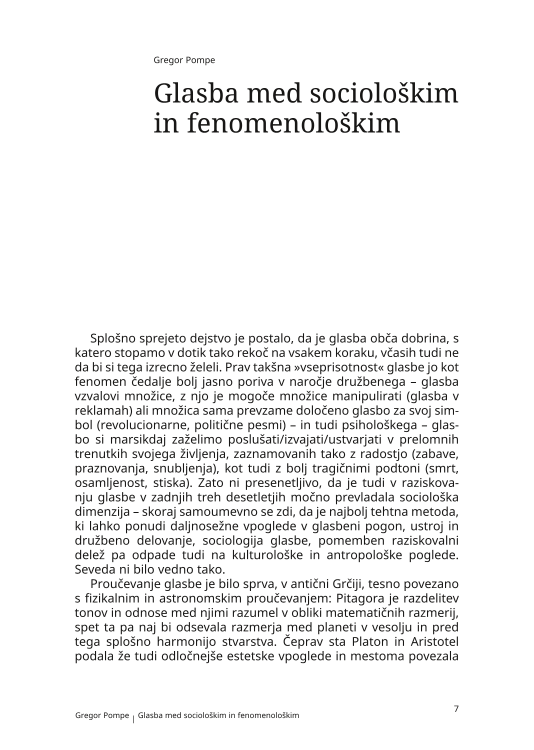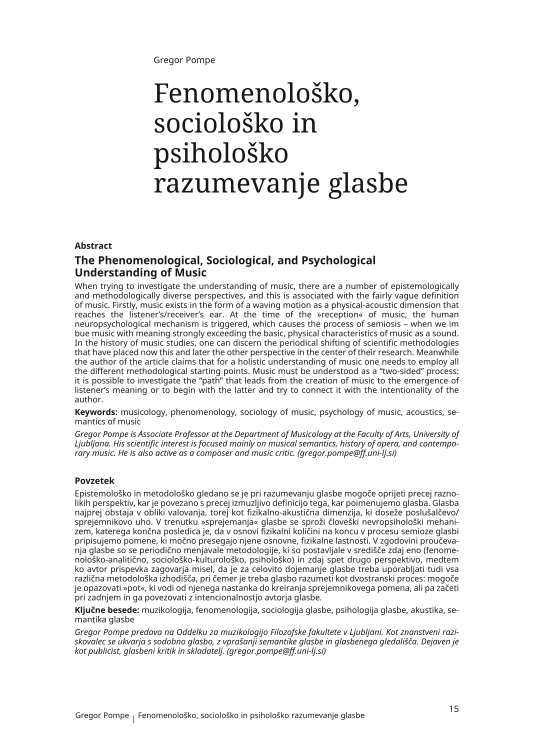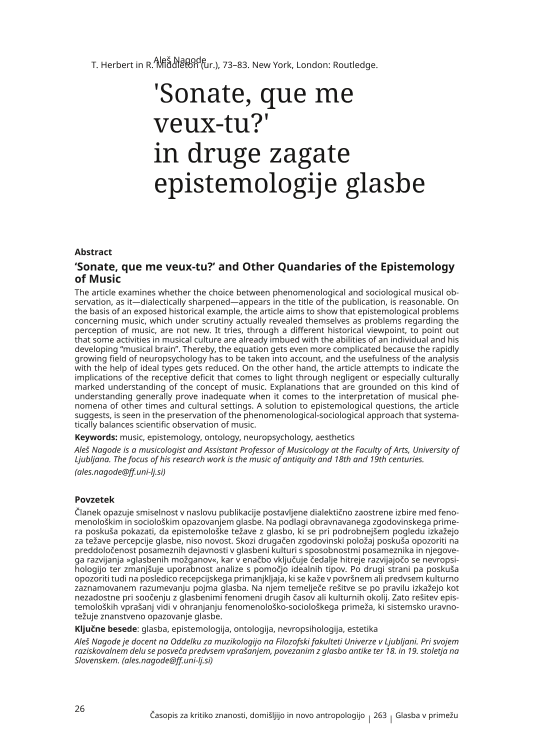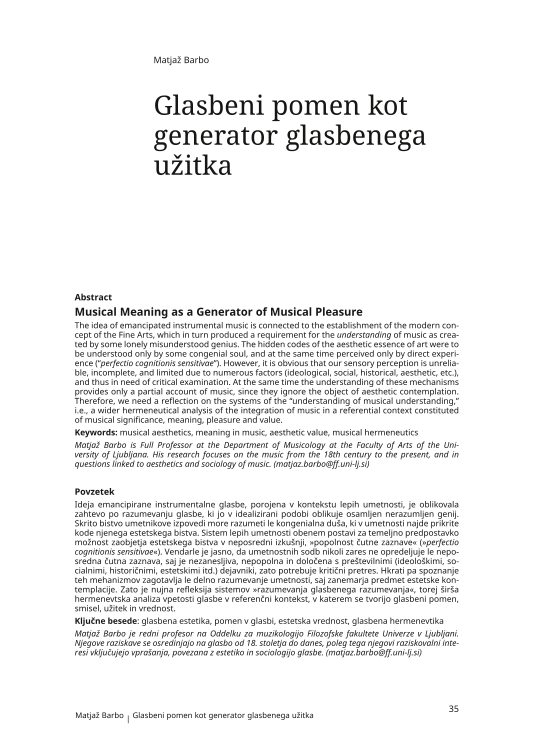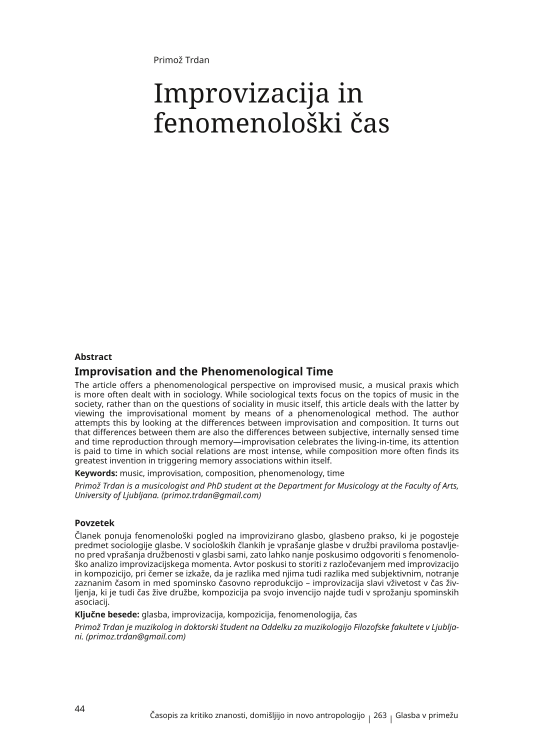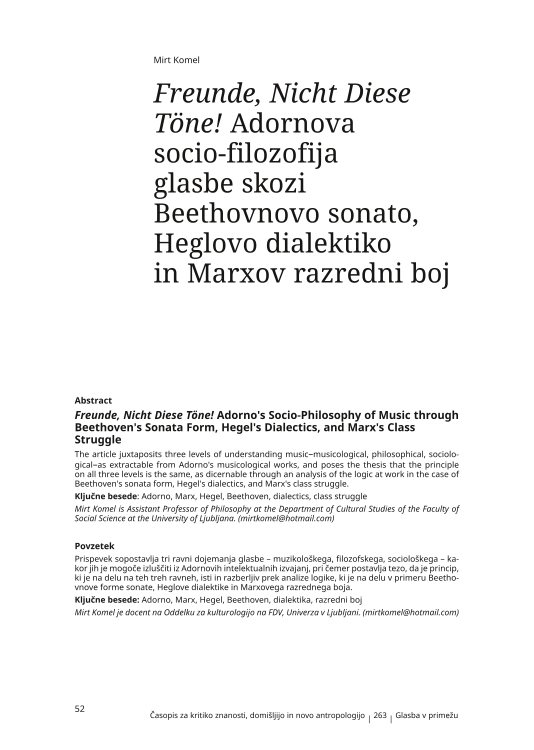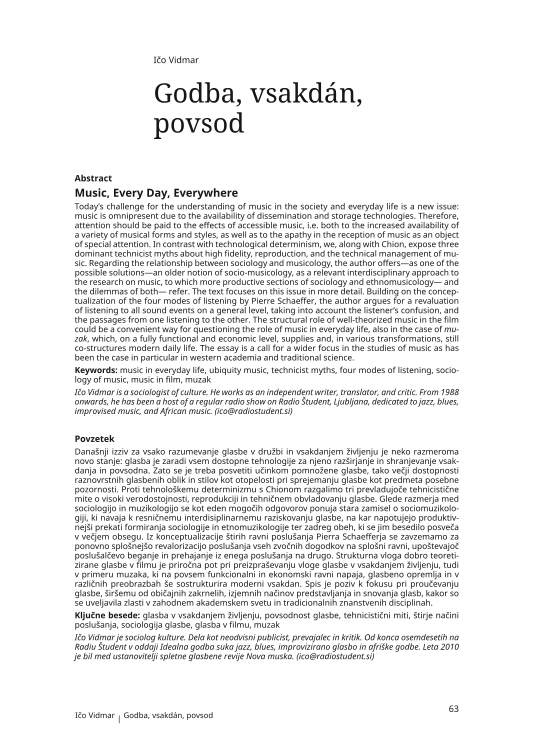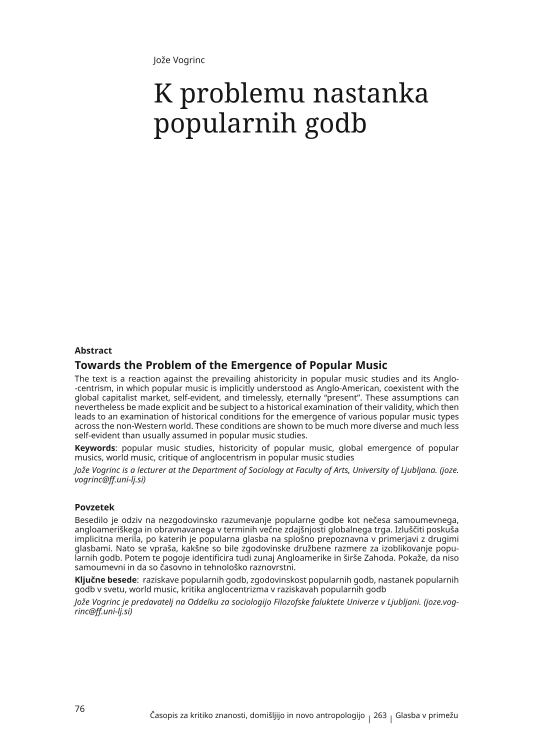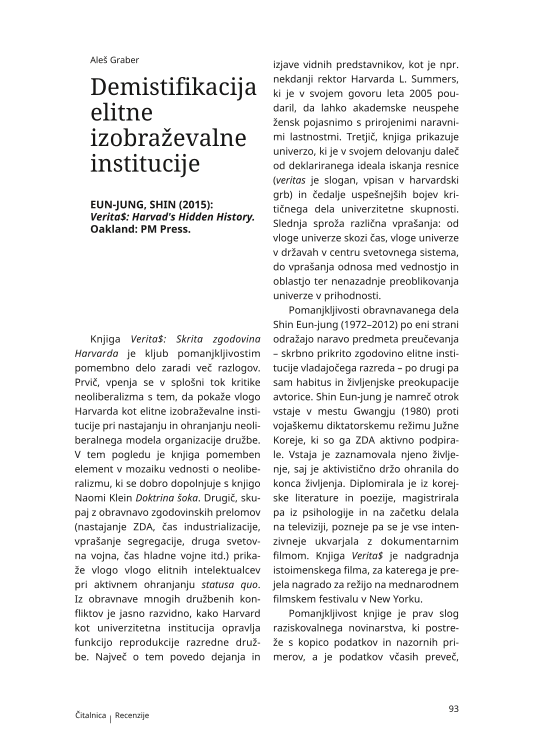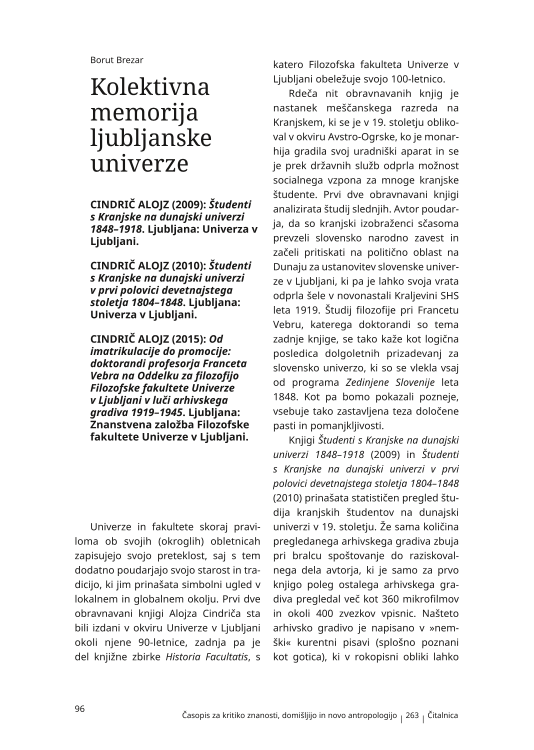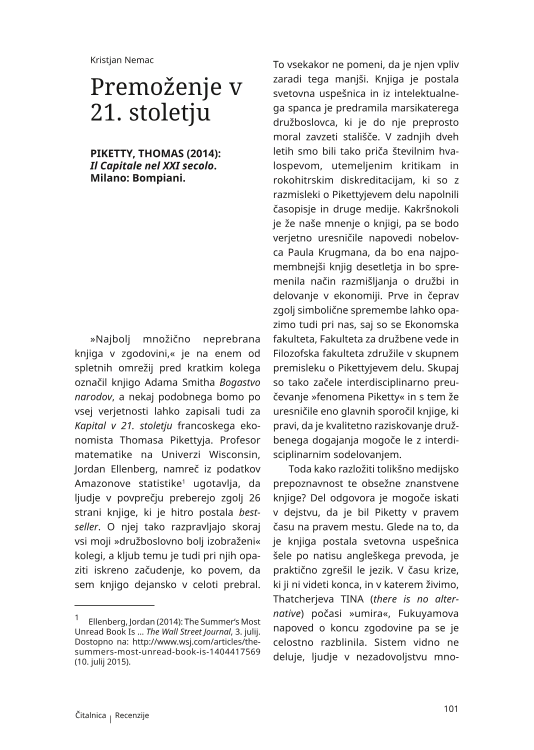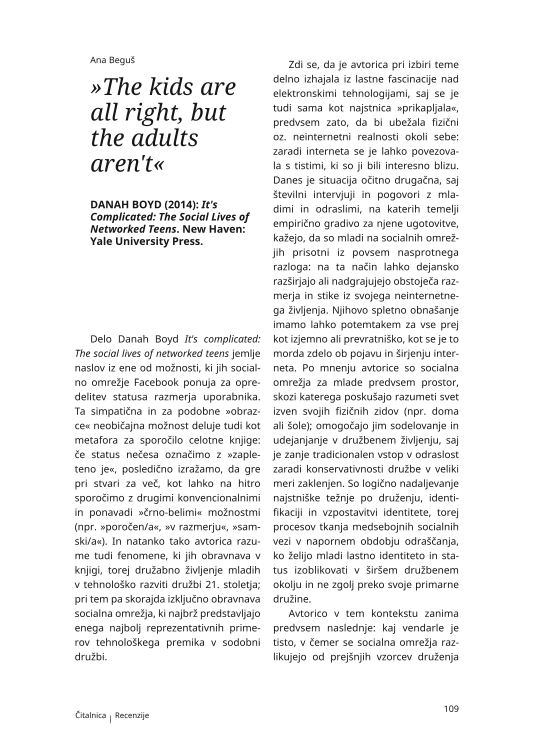Splošno sprejeto dejstvo je postalo, da je glasba obča dobrina, s katero stopamo v dotik tako rekoč na vsakem koraku, včasih tudi ne da bi si tega izrecno želeli. Prav takšna »vseprisotnost« glasbe jo kot fenomen čedalje bolj jasno poriva v naročje družbenega – glasba vzvalovi množice, z njo je mogoče množice manipulirati (glasba v reklamah) ali množica sama prevzame določeno glasbo za svoj simbol (revolucionarne, politične pesmi) – in tudi psihološkega – glasbo si marsikdaj zaželimo poslušati/izvajati/ustvarjati v prelomnih trenutkih svojega življenja, zaznamovanih tako z radostjo (zabave, praznovanja, snubljenja), kot tudi z bolj tragičnimi podtoni (smrt, osamljenost, stiska). Zato ni presenetljivo, da je tudi v raziskovanju glasbe v zadnjih treh desetletjih močno prevladala sociološka dimenzija – skoraj samoumevno se zdi, da je najbolj tehtna metoda, ki lahko ponudi daljnosežne vpoglede v glasbeni pogon, ustroj in družbeno delovanje, sociologija glasbe, pomemben raziskovalni delež pa odpade tudi na kulturološke in antropološke poglede. Seveda ni bilo vedno tako.
When trying to investigate the understanding of music, there are a number of epistemologically and methodologically diverse perspectives, and this is associated with the fairly vague definition of music. Firstly, music exists in the form of a waving motion as a physical-acoustic dimension that reaches the listener’s/receiver’s ear. At the time of the »reception« of music, the human neuropsychological mechanism is triggered, which causes the process of semiosis – when we im bue music with meaning strongly exceeding the basic, physical characteristics of music as a sound. In the history of music studies, one can discern the periodical shifting of scientific methodologies that have placed now this and later the other perspective in the center of their research. Meanwhile the author of the article claims that for a holistic understanding of music one needs to employ all the different methodological starting points. Music must be understood as a “two-sided” process: it is possible to investigate the “path” that leads from the creation of music to the emergence of listener’s meaning or to begin with the latter and try to connect it with the intentionality of the author.
The article examines whether the choice between phenomenological and sociological musical observation, as it—dialectically sharpened—appears in the title of the publication, is reasonable. On the basis of an exposed historical example, the article aims to show that epistemological problems concerning music, which under scrutiny actually revealed themselves as problems regarding the perception of music, are not new. It tries, through a different historical viewpoint, to point out that some activities in musical culture are already imbued with the abilities of an individual and his developing “musical brain”. Thereby, the equation gets even more complicated because the rapidly growing field of neuropsychology has to be taken into account, and the usefulness of the analysis with the help of ideal types gets reduced. On the other hand, the article attempts to indicate the implications of the receptive deficit that comes to light through negligent or especially culturally marked understanding of the concept of music. Explanations that are grounded on this kind of understanding generally prove inadequate when it comes to the interpretation of musical phenomena of other times and cultural settings. A solution to epistemological questions, the article suggests, is seen in the preservation of the phenomenological-sociological approach that systematically balances scientific observation of music.
The idea of emancipated instrumental music is connected to the establishment of the modern concept of the Fine Arts, which in turn produced a requirement for the understanding of music as created by some lonely misunderstood genius. The hidden codes of the aesthetic essence of art were to be understood only by some congenial soul, and at the same time perceived only by direct experience (“perfectio cognitionis sensitivae”). However, it is obvious that our sensory perception is unreliable, incomplete, and limited due to numerous factors (ideological, social, historical, aesthetic, etc.), and thus in need of critical examination. At the same time the understanding of these mechanisms provides only a partial account of music, since they ignore the object of aesthetic contemplation. Therefore, we need a reflection on the systems of the “understanding of musical understanding,” i.e., a wider hermeneutical analysis of the integration of music in a referential context constituted of musical significance, meaning, pleasure and value.
The article offers a phenomenological perspective on improvised music, a musical praxis which is more often dealt with in sociology. While sociological texts focus on the topics of music in the society, rather than on the questions of sociality in music itself, this article deals with the latter by viewing the improvisational moment by means of a phenomenological method. The author attempts this by looking at the differences between improvisation and composition. It turns out that differences between them are also the differences between subjective, internally sensed time and time reproduction through memory—improvisation celebrates the living-in-time, its attention is paid to time in which social relations are most intense, while composition more often finds its greatest invention in triggering memory associations within itself.
The article juxtaposits three levels of understanding music–musicological, philosophical, sociological–as extractable from Adorno's musicological works, and poses the thesis that the principle on all three levels is the same, as dicernable through an analysis of the logic at work in the case of Beethoven's sonata form, Hegel's dialectics, and Marx's class struggle.
Today’s challenge for the understanding of music in the society and everyday life is a new issue: music is omnipresent due to the availability of dissemination and storage technologies. Therefore, attention should be paid to the effects of accessible music, i.e. both to the increased availability of a variety of musical forms and styles, as well as to the apathy in the reception of music as an object of special attention. In contrast with technological determinism, we, along with Chion, expose three dominant technicist myths about high fidelity, reproduction, and the technical management of music. Regarding the relationship between sociology and musicology, the author offers—as one of the possible solutions—an older notion of socio-musicology, as a relevant interdisciplinary approach to the research on music, to which more productive sections of sociology and ethnomusicology— and the dilemmas of both— refer. The text focuses on this issue in more detail. Building on the conceptualization of the four modes of listening by Pierre Schaeffer, the author argues for a revaluation of listening to all sound events on a general level, taking into account the listener’s confusion, and the passages from one listening to the other. The structural role of well-theorized music in the film could be a convenient way for questioning the role of music in everyday life, also in the case of muzak, which, on a fully functional and economic level, supplies and, in various transformations, still co-structures modern daily life. The essay is a call for a wider focus in the studies of music as has been the case in particular in western academia and traditional science.
The text is a reaction against the prevailing ahistoricity in popular music studies and its Anglo-centrism, in which popular music is implicitly understood as Anglo-American, coexistent with the global capitalist market, self-evident, and timelessly, eternally “present”. These assumptions can nevertheless be made explicit and be subject to a historical examination of their validity, which then leads to an examination of historical conditions for the emergence of various popular music types across the non-Western world. These conditions are shown to be much more diverse and much less self-evident than usually assumed in popular music studies.
EUN-JUNG, SHIN (2015): Verita$: Harvad's Hidden History. Oakland: PM Press.
Knjiga Verita$: Skrita zgodovina Harvarda je kljub pomanjkljivostim pomembno delo zaradi več razlogov. Prvič, vpenja se v splošni tok kritike neoliberalizma s tem, da pokaže vlogo Harvarda kot elitne izobraževalne institucije pri nastajanju in ohranjanju neoliberalnega modela organizacije družbe. V tem pogledu je knjiga pomemben element v mozaiku vednosti o neoliberalizmu, ki se dobro dopolnjuje s knjigo Naomi Klein Doktrina šoka. Drugič, skupaj z obravnavo zgodovinskih prelomov (nastajanje ZDA, čas industrializacije, vprašanje segregacije, druga svetovna vojna, čas hladne vojne itd.) prikaže vlogo vlogo elitnih intelektualcev pri aktivnem ohranjanju statusa quo. Iz obravnave mnogih družbenih konfliktov je jasno razvidno, kako Harvard kot univerzitetna institucija opravlja funkcijo reprodukcije razredne družbe. Največ o tem povedo dejanja in izjave vidnih predstavnikov, kot je npr. nekdanji rektor Harvarda L. Summers, ki je v svojem govoru leta 2005 poudaril, da lahko akademske neuspehe žensk pojasnimo s prirojenimi naravnimi lastnostmi. Tretjič, knjiga prikazuje univerzo, ki je v svojem delovanju daleč od deklariranega ideala iskanja resnice (veritas je slogan, vpisan v harvardski grb) in čedalje uspešnejših bojev kritičnega dela univerzitetne skupnosti. Slednja sproža različna vprašanja: od vloge univerze skozi čas, vloge univerze v državah v centru svetovnega sistema, do vprašanja odnosa med vednostjo in oblastjo ter nenazadnje preoblikovanja univerze v prihodnosti.
CINDRIČ ALOJZ (2009): Študenti s Kranjske na dunajski univerzi 1848–1918. Ljubljana: Univerza v Ljubljani.
CINDRIČ ALOJZ (2010): Študenti s Kranjske na dunajski univerzi v prvi polovici devetnajstega stoletja 1804–1848. Ljubljana: Univerza v Ljubljani.
CINDRIČ ALOJZ (2015): Od imatrikulacije do promocije: doktorandi profesorja Franceta Vebra na Oddelku za filozofijo Filozofske fakultete Univerze v Ljubljani v luči arhivskega gradiva 1919–1945. Ljubljana: Znanstvena založba Filozofske fakultete Univerze v Ljubljani.
Univerze in fakultete skoraj praviloma ob svojih (okroglih) obletnicah zapisujejo svojo preteklost, saj s tem dodatno poudarjajo svojo starost in tradicijo, ki jim prinašata simbolni ugled v lokalnem in globalnem okolju. Prvi dve obravnavani knjigi Alojza Cindriča sta bili izdani v okviru Univerze v Ljubljani okoli njene 90-letnice, zadnja pa je del knjižne zbirke Historia Facultatis, s katero Filozofska fakulteta Univerze v Ljubljani obeležuje svojo 100-letnico. Rdeča nit obravnavanih knjig je nastanek meščanskega razreda na Kranjskem, ki se je v 19. stoletju oblikoval v okviru Avstro-Ogrske, ko je monarhija gradila svoj uradniški aparat in se je prek državnih služb odprla možnost socialnega vzpona za mnoge kranjske študente. Prvi dve obravnavani knjigi analizirata študij slednjih. Avtor poudarja, da so kranjski izobraženci sčasoma prevzeli slovensko narodno zavest in začeli pritiskati na politično oblast na Dunaju za ustanovitev slovenske univerze v Ljubljani, ki pa je lahko svoja vrata odprla šele v novonastali Kraljevini SHS leta 1919. Študij filozofije pri Francetu Vebru, katerega doktorandi so tema zadnje knjige, se tako kaže kot logična posledica dolgoletnih prizadevanj za slovensko univerzo, ki so se vlekla vsaj od programa Zedinjene Slovenije leta 1848. Kot pa bomo pokazali pozneje, vsebuje tako zastavljena teza določene pasti in pomanjkljivosti.
PIKETTY, THOMAS (2014): Il Capitale nel XXI secolo. Milano: Bompiani.
»Najbolj množično neprebrana knjiga v zgodovini,« je na enem od spletnih omrežij pred kratkim kolega označil knjigo Adama Smitha Bogastvo narodov, a nekaj podobnega bomo po vsej verjetnosti lahko zapisali tudi za Kapital v 21. stoletju francoskega ekonomista Thomasa Pikettyja. Profesor matematike na Univerzi Wisconsin, Jordan Ellenberg, namreč iz podatkov Amazonove statistike ugotavlja, da ljudje v povprečju preberejo zgolj 26 strani knjige, ki je hitro postala bestseller. O njej tako razpravljajo skoraj vsi moji »družboslovno bolj izobraženi« kolegi, a kljub temu je tudi pri njih opaziti iskreno začudenje, ko povem, da sem knjigo dejansko v celoti prebral. To vsekakor ne pomeni, da je njen vpliv zaradi tega manjši. Knjiga je postala svetovna uspešnica in iz intelektualnega spanca je predramila marsikaterega družboslovca, ki je do nje preprosto moral zavzeti stališče. V zadnjih dveh letih smo bili tako priča številnim hvalospevom, utemeljenim kritikam in rokohitrskim diskreditacijam, ki so z razmisleki o Pikettyjevem delu napolnili časopisje in druge medije. Kakršnokoli je že naše mnenje o knjigi, pa se bodo verjetno uresničile napovedi nobelovca Paula Krugmana, da bo ena najpomembnejši knjig desetletja in bo spremenila način razmišljanja o družbi in delovanje v ekonomiji. Prve in čeprav zgolj simbolične spremembe lahko opazimo tudi pri nas, saj so se Ekonomska fakulteta, Fakulteta za družbene vede in Filozofska fakulteta združile v skupnem premisleku o Pikettyjevem delu. Skupaj so tako začele interdisciplinarno preučevanje »fenomena Piketty« in s tem že uresničile eno glavnih sporočil knjige, ki pravi, da je kvalitetno raziskovanje družbenega dogajanja mogoče le z interdisciplinarnim sodelovanjem.
DANAH BOYD (2014): It's Complicated: The Social Lives of Networked Teens. New Haven: Yale University Press.
Delo Danah Boyd It's complicated: The social lives of networked teens jemlje naslov iz ene od možnosti, ki jih socialno omrežje Facebook ponuja za opredelitev statusa razmerja uporabnika. Ta simpatična in za podobne »obrazce « neobičajna možnost deluje tudi kot metafora za sporočilo celotne knjige: če status nečesa označimo z »zapleteno je«, posledično izražamo, da gre pri stvari za več, kot lahko na hitro sporočimo z drugimi konvencionalnimi in ponavadi »črno-belimi« možnostmi (npr. »poročen/a«, »v razmerju«, »samski/ a«). In natanko tako avtorica razume tudi fenomene, ki jih obravnava v knjigi, torej družabno življenje mladih v tehnološko razviti družbi 21. stoletja; pri tem pa skorajda izključno obravnava socialna omrežja, ki najbrž predstavljajo enega najbolj reprezentativnih primerov tehnološkega premika v sodobni družbi.




